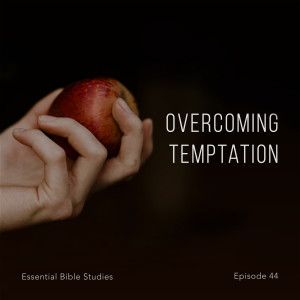Essential Bible Studies
The Essential Bible Studies podcast is an introductory discussion around Biblical first principles. The Bible is a complex book. It’s easy to misunderstand and get off track if you don’t grasp its basic teachings. The show engages in key passages and unpacks them in a lively conversation to reveal how they touch on our core beliefs. Your hosts bring with them years of experience as presenters from the Learn to Read the Bible Seminars. Hosted by the Book Road Christadelphians.
The Essential Bible Studies podcast is an introductory discussion around Biblical first principles. The Bible is a complex book. It’s easy to misunderstand and get off track if you don’t grasp its basic teachings. The show engages in key passages and unpacks them in a lively conversation to reveal how they touch on our core beliefs. Your hosts bring with them years of experience as presenters from the Learn to Read the Bible Seminars. Hosted by the Book Road Christadelphians.
Episodes

Monday Apr 04, 2022
The Ways of Providence (Part 1) - God’s Hand in Your Life
Monday Apr 04, 2022
Monday Apr 04, 2022
For the first time we have Dan from the Bible Basics Webinar (www.biblebasicswebinar.com) here to talk with us about the providence of God. This is an essential Bible study because it gets at the heart of how we perceive the circumstances of our life. Are events just by chance or can God manipulate them for his purpose? This question leads us to consider many examples from the Bible of how God works behind the scenes in the lives of believers.
Key Verse:
“But all this I laid to heart, examining it all, how the righteous and the wise and their deeds are in the hand of God. Whether it is love or hate, man does not know; both are before him.” Ecclesiastes 9:1
Show Notes:
What is Providence?
the invisible hand of God working in our lives
Example of Elisha (2 Kings 6:15-17)
The angels (Psalm 34:7)
The book The Ways of Providence by Robert Roberts (hardcopy here or here)
Awareness of God in our lives
Providence vs. Miracles
Providence is more applicable to today
Example of the healing of the man blind from birth in John 9
His healing = a miracle
His circumstances = providence “that the works of God might be manifest in him”
Providence vs. Time and Chance
Ecc. 9:1 “the righteous and the wise and their works are in the hand of God” vs. Ecc. 9:11 “time and chance happens to them all”
“God has control of chance, but not all chance is controlled by God” (The Ways of Providence, Robert Roberts., pg. 5)
Proverbs 3:5-6 - God will direct our paths, if… 1) we acknowledge Him. 2) trust in Him. 3) lean not on our own understanding
God’s direction over our lives can be lost (e.g. Saul 1 Samuel 18:12; 28:15)
Life Won’t Always Be Easy Because of Providence
Example of Job - “shall we receive good at the hand of God and shall we not receive evil?” (Job 2:9-10)
God promised to keep Jacob in all his ways (Genesis 28:15; 41:9; 48:16)
“All things work together for them that love God…” (Romans 8:28-32)
The Importance of Knowing God’s Will
Danger of assuming that circumstances in life are clearly a result of God pointing us in a certain direction (e.g. of David with Saul in 1 Samuel 26:7-11,18-19)
We must make life decisions based on Biblical discernment, not on what appears to be a direction God is sending us
We Might Be the Instrument of Providence for Others
God uses various means to accomplish his will
Control of nature
The angels
Us! Examples of Abigail (1 Samuel 25:26,32-34 and Esther 4:14)
Follow us on... Facebook: https://www.facebook.com/essentialbiblestudies Instagram: https://www.instagram.com/essentialbiblestudies/ X: https://x.com/bible_podcast Get it... Get an invite to our Tuesday night Bible Studies at essentialbiblestudies.org Request a free Essential Bible Studies media kit

Monday Mar 28, 2022
The Word was made Flesh
Monday Mar 28, 2022
Monday Mar 28, 2022
In conjunction with last week’s podcast from John 1:1, Jay and Tim consider the context and the importance of verse 14, “the Word was made flesh”. What is it about Jesus being flesh that is so crucial to his sacrifice? Does it contradict the doctrine of the Trinity? How are we to understand this glory that was seen? The scriptures lead us to the wonderful conclusion that we will all eventually share in the divine nature, Jesus being the first among many.
Key Verse:
“And the Word became flesh and dwelt among us, and we have seen his glory, glory as of the only Son from the Father, full of grace and truth.” John 1:14
Show Notes:
The Importance of Jesus Being Flesh
Flesh and blood the same as our nature (Hebrews 2:14) the key to the sacrifice of Christ.
Had to be tempted like us (Hebrews 4:14-15). God cannot be tempted (James 1:13).
Flesh is sinful! This is why his obedience is such a wonder. He had to overcome the temptations of flesh like no other man.
Made Flesh: What it Doesn’t Mean
Revisiting the definition of the Trinity and the nature of Jesus and God
Was Jesus the God-man? Is he just a man? Neither is true.
Jesus was a special creation made strong by his Father (John 3:34; 2 Cor. 5:19)
We Have Seen His Glory
What is glory? Both moral and physical.
The moral glory (Exodus 34:6 cp. John 1:14). The wider purpose of God to fill the earth with this glory (Numbers 14:21; Isaiah 11:9; Habakkuk 2:14).
His physical glory – the example and meaning of the transfiguration (2 Peter 1:16-18). Jesus the first to be transformed (Philippians 3:20-21; 2 Peter 1:4).
The Apostle saw both of these glories (1 John 1:1-3)
Follow us on... Facebook: https://www.facebook.com/essentialbiblestudies Instagram: https://www.instagram.com/essentialbiblestudies/ X: https://x.com/bible_podcast Get it... Get an invite to our Tuesday night Bible Studies at essentialbiblestudies.org Request a free Essential Bible Studies media kit

Monday Mar 21, 2022
In the Beginning was the Word
Monday Mar 21, 2022
Monday Mar 21, 2022
John starts off his gospel by saying “In the beginning was the Word, and the Word was with God, and the Word was God”. This is a key verse for what many refer to as the Trinity. Jay and Tim discuss an attempt at a simple definition of the Trinity and whether this verse supports it. They then get into looking at what John is truly saying about the Word and Jesus by his use of the principle of personification found in other scriptures and the New Testament concept of a new creation in Christ Jesus.
Key Verse:
“In the beginning was the Word, and the Word was with God, and the Word was God.” John 1:1
Show Notes:
The Trinity in a Nutshell (https://credohouse.org/blog/the-doctrineof-the-trinity-in-a-nutshell)
The Word was God
The Word is the expression of the thoughts and wisdom of God
The Word is Who He is, Love is Who He is, Light is Who He is
God is light (1 John 1:5) – intelligence, understanding, purity, truth, righteousness, life
God is love (1 John 4:8,16) – reconciling, slow to anger, tender care, rebuke and correction
It all starts with God. We come to know Him – His love, His light – through the Word.
Everything that Word is – love and light, grace and truth – was revealed in flesh and blood – when the Word was made flesh.
The Word in the Beginning of Creation
The Greek word for “Word” is Logos
The Word is the expression of the thoughts and wisdom of God (Psa. 33:6)
An appeal to consider Genesis
“Light” is the first spoken word that the Bible attributes to God! (Genesis 1:1-3)
The Word was with God in the Beginning
Personification of the word (Isaiah 55:10-11)
More personification (Psalm 107:20; 147:15; 2 Thessalonians 3:1)
Personification of the wisdom of God (a woman!), that was WITH God (Proverbs 8:1-2; 22-31)
Christ and the New Creation
The new creation (Colossians 1:13-20; 2 Corinthians 4:5-7)
The new beginning (Mark 1:1; Luke 1:2; John 1:12-13)
Follow us on... Facebook: https://www.facebook.com/essentialbiblestudies Instagram: https://www.instagram.com/essentialbiblestudies/ X: https://x.com/bible_podcast Get it... Get an invite to our Tuesday night Bible Studies at essentialbiblestudies.org Request a free Essential Bible Studies media kit

Monday Mar 14, 2022
The Virgin Shall Conceive
Monday Mar 14, 2022
Monday Mar 14, 2022
Knowing Jesus better starts with his miraculous birth, born of a virgin by the power of the Holy Spirit. Jesse rejoins Tim to expand on studies from Genesis 3:15 to see how this prophecy/promise sets the stage. We delve into some wonderful verses in Isaiah predicted that Jesus would be born of a virgin. The Scriptures then lead us to the fulfillment in the Lord Jesus Christ and what it ultimately means that he was both the Son of God but also the Son of Man.
Key Verse:
“Therefore the Lord himself will give you a sign. Behold, the virgin shall conceive and bear a son, and shall call his name Immanuel.” Isaiah 7:14
Show Notes:
Revisiting Genesis 3:15 and the prophecy of Jesus that sets the compass for the dual aspect of Christ being both the Son of God and Son of Man.
Isaiah’s Prophecies of the Virgin Birth (Isaiah 7:13-15; 9:6-7; 49:1-2)
The Prophecies Fulfilled in the New Testament (Matthew 1:20-23; Luke 1:26-33)
Why the Virgin Birth is important and why Jesus is both Son of God and Son of Man (John 5:24-29)
Follow us on... Facebook: https://www.facebook.com/essentialbiblestudies Instagram: https://www.instagram.com/essentialbiblestudies/ X: https://x.com/bible_podcast Get it... Get an invite to our Tuesday night Bible Studies at essentialbiblestudies.org Request a free Essential Bible Studies media kit

Monday Mar 07, 2022
Overcoming Temptation
Monday Mar 07, 2022
Monday Mar 07, 2022
With all this talk about sin on the podcast lately, it’s about time we discuss some practical matters on how to overcome temptation. Stephen joins Tim to discuss the Biblical definition of temptation and provide examples and stories to help us in our fight against sin. Find out what it means to “not pack a snack for the flesh”.
Key Verse:
“Let no one say when he is tempted, “I am being tempted by God,” for God cannot be tempted with evil, and he himself tempts no one. But each person is tempted when he is lured and enticed by his own desire.” James 1:13-14
Show Notes:
Temptation Defined
Temptation a major topic of the Bible from Genesis
James 1:12-14 defines temptation and our need for God
Desires are not bad in themselves (Luke 22:15)
The worlds overwhelming temptations. Lusts that war against our souls (1 Peter 2:11)
Recognize Temptation
Where temptation originates (James 1:13)
The example of Samson (Judges 13&14)
The categories of lusts in the world (1 John 2:15-16)
Overcoming Temptation and Sin
Jesus’ instruction in the Lord’s prayer (Matthew 6:13)
Taking God’s escape route, fleeing temptation (1 Corinthians 10:12-14)
Practical points: David (Proverbs 28:13), Paul (Romans 7:18-23)
Do not make provision for the flesh (Romans 13:14)
Practical Points for Discipleship
The need for prayer (Philippians 4:6-7)
Guards - why you have them, how to implement
Jesus’ example in the wilderness temptation using the word of God (Matthew 4)
Follow us on... Facebook: https://www.facebook.com/essentialbiblestudies Instagram: https://www.instagram.com/essentialbiblestudies/ X: https://x.com/bible_podcast Get it... Get an invite to our Tuesday night Bible Studies at essentialbiblestudies.org Request a free Essential Bible Studies media kit

Monday Feb 28, 2022
The Curse of the Serpent
Monday Feb 28, 2022
Monday Feb 28, 2022
After the fall of man, God pronounces a curse upon the serpent which includes an enigmatic statement concerning a future enmity. Jesse joins Tim for the first time to discuss this earliest of prophecies about the Lord Jesus Christ and how he would crush the head of the serpent. Listen in as we break down each of the characters and what the allegory all means.
Key Verse: “I will put enmity between you and the woman, and between your offspring and her offspring; he shall bruise your head, and you shall bruise his heel.” Gen 3:15
Show Notes:
Introduction
The Edenic covenant in Genesis 3:15 is the first prophecy and promise of the Bible. It is an allegory using events to represent another spiritual meaning.
Quick overview of what is represented by the serpent, woman and the two seeds.
The Serpent
More subtle than any beast of the field that God had made (3:1)
Spoke based on animal instincts to speak a lie therefore represents the mind of the flesh at enmity with God (Rom. 8:7)
The Woman
She proclaimed the truth of God’s revelation even though she was beguiled.
The woman represents the mind of the Spirit (Rom. 8:5)
The Seed of the Serpent
The wicked are described as a generation of vipers (Psalm 58:4; 140:3; Matt 23:33; John 8:44)
The seed of the Serpent are therefore those ruled by the mind of the flesh.
The Seed of the Woman
Represents those who have the mind of the Spirit.
First of all, this is Jesus (Gal. 3:16; 4:4)
Second, it is all those who seek to be like Jesus, transforming their minds (Rom 6:11-13; Gal 3:26-29; Eph 4:22-24)
The Defeat of Sin
“Bruise” = crush. The difference between a wound to the heel and head.
How that relates to Christ’s death and resurrection (Heb. 2:14)
Conclusion
Follow us on... Facebook: https://www.facebook.com/essentialbiblestudies Instagram: https://www.instagram.com/essentialbiblestudies/ X: https://x.com/bible_podcast Get it... Get an invite to our Tuesday night Bible Studies at essentialbiblestudies.org Request a free Essential Bible Studies media kit

Monday Feb 21, 2022
Sin Entered the World
Monday Feb 21, 2022
Monday Feb 21, 2022
In this episode, Rob and Tim read through and discuss the Bible's record of the very first sin in Genesis 2 and 3. Why was there a tree of the knowledge of good and evil? Why did God command Adam not to eat of it? What is up with the serpent? What lessons can we learn about temptation and sin? It’s all here in this episode.
Key Verse: “Therefore, just as sin came into the world through one man, and death through sin, and so death spread to all men because all sinned" Romans 5:12
Show Notes:
Introduction
Sin is the cause of death (Rom. 6:23)
Sin and therefore death came by one man (Rom. 5:12)
The First Sin – Reading through Genesis 2 and 3
Genesis 2:16-17 – God’s law and its consequence
Genesis 3:1,4 – The serpent and the lie
Genesis 3:6-7 – Temptation (1 John 2:16; James 1:14) and the fall of man
Final conclusion
The seriousness of sin and its effects on the whole world
Hope and forgiveness in Jesus (1 John 3:5)
Follow us on... Facebook: https://www.facebook.com/essentialbiblestudies Instagram: https://www.instagram.com/essentialbiblestudies/ X: https://x.com/bible_podcast Get it... Get an invite to our Tuesday night Bible Studies at essentialbiblestudies.org Request a free Essential Bible Studies media kit

Monday Feb 14, 2022
Sin in Five Verses
Monday Feb 14, 2022
Monday Feb 14, 2022
From Genesis to Revelation, sin is a major topic. One could even say it is a subject of life and death. Rob joins Tim to get a grasp on five verses that define sin. They are all very similar, yet each has its own nuance. The more we get into this study the more we get a sense of the seriousness of sin and letting God define it for us.
Key Verse:
“For the wages of sin is death, but the free gift of God is eternal life in Christ Jesus our Lord.” Rom 6:23
The Five Verses:
#1 – Sin is lawlessness (1 John 3:4)
#2 – All unrighteousness is sin (1 John 5:17)
#3 – What is not of faith is sin (Rom. 14:23)
#4 – Failing to do right is sin (James 4:17)
#5 - Coming short of the glory of God (Rom 3:23)
Follow us on... Facebook: https://www.facebook.com/essentialbiblestudies Instagram: https://www.instagram.com/essentialbiblestudies/ X: https://x.com/bible_podcast Get it... Get an invite to our Tuesday night Bible Studies at essentialbiblestudies.org Request a free Essential Bible Studies media kit

Monday Feb 07, 2022
The Greatest of these is Love
Monday Feb 07, 2022
Monday Feb 07, 2022
Could there be any more beautifully expressed words then Paul's exposition on love in 1 Corinthians 13? Join Brian and Tim and as they talk about the Greek words for love to get a better understanding of how to love like Christ. They then go on to explore each phrase and consider what it means for us in our life of discipleship.
Key Verse:
“So now faith, hope, and love abide, these three; but the greatest of these is love.” 1 Corinthians 13:13
Handouts:
1 Corinthians 13 Version Comparison Spreadsheet
1 Corinthians 13 Comparison with Exodus 34
1 Corinthians 13 Comparison with Galatians 5
Show Notes:
Definitions of the Greek words for love
Agape (Strong G25, G25 and G27) - to love (in a social or moral sense)
Phileo (Strongs G5368) to be a friend to (fond of (an individual or an object)), i.e. have affection for (denoting personal attachment, as a matter of sentiment or feeling; while agape is wider, embracing especially the judgment and the deliberate assent of the will as a matter of principle, duty and propriety: the two thus stand related very much as G2309 and G1014, or as G2372 and G3563 respectively; the former being chiefly of the heart and the latter of the head)
Root G5384 philos - properly dear, ie. a friend
Used as a root of several other words. G5386 philosophos - philosopher, fond of wise things
Quotes about love
Agape is “the love that flows from a person’s association with God’s purpose in Christ, a principled love that is not free from passion, but is not driven by passion.” - Michael Ashton, The Christadelphian Magazine, 2002.
“the Greek agape takes on a special meaning: it is used to designate a volitional (or relating to one’s will) love as opposed to the purely emotional kind. It is a self-sacrificial love, a kind naturally expressed by God.” – Stephen Whitehouse, The Christadelphian Magazine, 2009.
Special verse that define agape love as self sacrificing (John 15:13; Rom. 5:8; John 3:16).
The beautiful definition of love in 1 Corinthians 13
Appreciating the context and comparing different versions.
Similarities between 1 Cor. 13 and the character of God in Ex. 34:6-7 and the fruits of the spirit in Gal. 5:22-23.
Breaking down 1 Corinthians 13
“Love is patient and kind” compare Eph. 4:1-3. “Kindness is love communicating” Dennis Gillet, Genius of Discipleship
“love does not envy or boast; it is not arrogant”. KJV “not puffed up”. This was a problem with the Corinthians (4:6, 18, 19; 5:2; 8:1)
“love is not rude”
“It does not insist on its own way”, not self-centered
“it is not irritable”, that is, not easily provoked to anger.
“or resentful” literally mean to not keep a record of wrongs. Doesn’t hold grudges.
“it does not rejoice at wrongdoing, but rejoices with the truth.”
Two ways of interpreting this – love does not gloat over the wickedness of others (Ezek. 33:11) and love does not overlook error but speaks the truth (2 Tim. 2:17; Eph. 4:15)
“Love bears all things”. Literally means to cover over like a roof. Compare Prov. 10:12; 17:9
“believes all things, hopes all things, endures all things.”
Love includes faith (belief) and hope
In the Kingdom there will be no need for faith (Heb. 11:1) or hope (Rom. 8:24) but love will endure.
J.B. Phillips translation of 1 Cor. 13:7-8 “Love knows no limit to its endurance, no end to its trust, no fading of its hope; it can outlast anything. It is, in fact, the one thing that still stands when all else has fallen.”
Follow us on... Facebook: https://www.facebook.com/essentialbiblestudies Instagram: https://www.instagram.com/essentialbiblestudies/ X: https://x.com/bible_podcast Get it... Get an invite to our Tuesday night Bible Studies at essentialbiblestudies.org Request a free Essential Bible Studies media kit

Monday Jan 31, 2022
In the Image and Likeness of God (Part 2)
Monday Jan 31, 2022
Monday Jan 31, 2022
The discussion on man being in the image of God continues in this episode where it focuses on Jesus Christ. How is he described as being in God's image and what is the implication for us? The conclusion to this study is a beautiful realization that our hope is to made into the image of the heavenly after the pattern of the Lord Jesus Christ.
Key verse:
2 Cor. 3:18 "And we all, with unveiled face, beholding the glory of the Lord, are being transformed into the same image from one degree of glory to another. For this comes from the Lord who is the Spirit."
Show notes:
Intro and Recap
Jesus is the image of the invisible God (Col. 1:15; Heb. 1:3 NLT). The image is about having the characteristics of God.
When Paul quotes Gen. 1:26 he says “image and glory” (1 Cor. 11:7). How is glory related to likeness?
We are living a process of being made into the image of Christ (2 Cor. 3:18; 4:4-6; Col. 3:9-10; Rom. 8:29)
We were born with the image and likeness of Adam (Gen. 5:1-3) the image of the earthly (1 Cor. 15:49) but being born again into Christ hope to in the image of the heavenly (1 Cor. 15:49)
Final conclusion
Follow us on... Facebook: https://www.facebook.com/essentialbiblestudies Instagram: https://www.instagram.com/essentialbiblestudies/ X: https://x.com/bible_podcast Get it... Get an invite to our Tuesday night Bible Studies at essentialbiblestudies.org Request a free Essential Bible Studies media kit

Monday Jan 24, 2022
In the Image and Likeness of God (Part 1)
Monday Jan 24, 2022
Monday Jan 24, 2022
What does it mean for man to be created in the image and likeness of God? Is it a physical image or something else? Frank and Tim start a discussion on this topic taken from Genesis 1:26. It turns into a really interesting study taking the show to unexpected passages in Scripture looking for answers.
Key Verse:
Genesis 1:26 “Then God said, ‘Let us make man in our image, after our likeness. And let them have dominion over the fish of the sea and over the birds of the heavens and over the livestock and over all the earth and over every creeping thing that creeps on the earth.’”
Show Notes:
Introduction
Gen. 1:26 - Why does the grammar change to “us” at this point? Our hope is to be make like the angels (Luke 20:36) therefore the angels are involved at this point rather than begin directed as the case with the animals.
The image and likeness of God
What makes us like God compared to the beasts? “after his kind” (1:24-25) -> “after our likeness” (1:26-27), Psa. 49:20
Is there a difference between image and likeness?
God commands nothing to be made in his image (Deut. 4:12,15-19; Rom. 1:23 “corruptible man”)
The future aspect of being made into the God’s image (Psa. 17:15; 1 John 3:2; Phil. 3:21)
Follow us on... Facebook: https://www.facebook.com/essentialbiblestudies Instagram: https://www.instagram.com/essentialbiblestudies/ X: https://x.com/bible_podcast Get it... Get an invite to our Tuesday night Bible Studies at essentialbiblestudies.org Request a free Essential Bible Studies media kit

Monday Jan 17, 2022
The Greatest Commandment
Monday Jan 17, 2022
Monday Jan 17, 2022
Jesus said the greatest commandment of all was “You shall love the Lord your God with all your heart and with all your soul and with all your mind." and that there was a second like it "You shall love your neighbor as yourself." This was so important that he said, "on these two commandments depend all the Law and the Prophets.” (Matt. 22:37-40)
Tim and Aaron explore the importance of love as an essential of essential Bible studies. They go back to the Old Testament reference that Jesus draws upon as well as the context. Discover what love is really all about and how to know and show forth the love of God in your life.
For more shows or to get in contact with us go to www.essentialbiblestudies.org
Cover art from Unsplash
Follow us on... Facebook: https://www.facebook.com/essentialbiblestudies Instagram: https://www.instagram.com/essentialbiblestudies/ X: https://x.com/bible_podcast Get it... Get an invite to our Tuesday night Bible Studies at essentialbiblestudies.org Request a free Essential Bible Studies media kit






